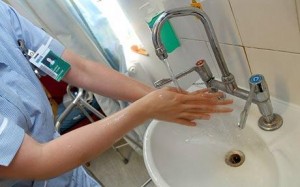![]() Nov. 17, 2014 – A new study shows that hospital workers wash their hands less frequently as their workday progresses, a finding that underscores the need for RFID-based monitoring to boost compliance, reduce infections and saves lives while lowering costs.
Nov. 17, 2014 – A new study shows that hospital workers wash their hands less frequently as their workday progresses, a finding that underscores the need for RFID-based monitoring to boost compliance, reduce infections and saves lives while lowering costs.
The study, conducted by the Wharton School at University of Pennsylvania and the University of North Carolina at Chapel Hill, analyzed three years of hand-washing data from 4,157 caregivers in 35 U.S. hospitals. Researchers found that hand-washing compliance rates dropped an average of 8.7 percentage points from the beginning to the end of a typical 12-hour shift. The decline in compliance was magnified by increased work load.
“Just as the repeated exercise of muscles leads to physical fatigue, repeated use of executive resources (cognitive resources that allow people to control their behaviors, desires and emotions) produces a decline in an individual’s self-regulatory capacity,” researchers found.
“Demanding jobs have the potential to energize employees, but the pressure may make them focus more on maintaining performance on their primary tasks (e.g., patient assessment, medication distribution), particularly when they are fatigued,” lead researcher Hengchen Dail noted. “For hospital caregivers, hand washing may be viewed as a lower-priority task and thus it appears compliance with hand hygiene guidelines suffers as the workday progresses.”
Hand washing in hospitals and clinics reduces infections, including from multidrug-resistant organisms such as E. coli, pneumonia and MRSA, and saves money. A 2000 study of Swiss hospitals found that a 1 percentage point increase in hand-washing compliance reduced the number of infections by 3.9 per 1,000 patients. Another 2009 study estimated that the cost per patient with a health care-acquired infection is $20,549.
Extrapolating their findings to all 5,723 US hospitals, Dail and her team estimated there would be an additional 600,000 infections per year at a cost of approximately $12.5 billion.
RFID-based hand hygiene solutions monitor whether health care workers adhere to protocols by washing/sanitizing their hands within specified time limits when entering or leaving patients’ rooms. Some systems use devices attached to hand soap and sanitizer dispensers that read caregivers’ RFID badges, collecting data about each hand-washing event – the dispenser location, length of action, type of sanitizer – to a software application that ties into a facility’s broader infrastructure of servers and databases. Each event is associated with a unit, floor or individual so that administrators and personnel can view compliance reports and dashboards.
An RFID hand-hygiene solution can be a standalone system or part of a real-time location system (RTLS) to track assets and monitor patients. It can be deployed throughout a hospital or one unit at a time depending on a facility’s infrastructure, taking into consideration interference, data storage capacity and budget.
A trial of RFID-enabled hand-washing stations has allowed supervisors at OhioHealth’s Riverside Methodist Hospital to view usage and take steps to promote compliance, while personnel can view their own performance as well as their colleagues’. The hospital will be a presenter at RFID in Health Care, an exhibit sponsored by RFID Journal on Thursday, Nov. 20.
Riverside Methodist’s system enables nurse managers to identify whether a worker has complied with hand-hygiene requirements. To encourage compliance, the hospital posts the rates at which health-care personnel washed their hands as expected, enabling them to compare their own compliance rates against those of their colleagues.
Read more about the study, which suggested that longer breaks might help healthcare workers increase their hand hygiene compliance.
——–
The Swiftsure Group offers integrated solutions for regulatory compliance, operational efficiency, enhanced security and audit support across many sectors, including healthcare, financial services, education and transportation.
